What’s going on with Google, fake reviews, and “review removal” services right now? BrightLocal contributor and Google Business Profile Gold Product Expert, Sam Knight, takes on the thorny issue and finds all is not well in the realm of reviews. Hold onto your hats—it’s about to get messy.
Fake reviews are out of control on Google. Signaling a desire to address the problem, Google released tougher GBP guidelines last week that warn merchants of new punishments for “fake engagement”.
This should be a welcomed change, of course. But is it too little, too late? Will these new policies actually help? And will innocent merchants suffer too?
Considering merchants are already suffering from weak policy enforcement and seemingly automated appeal tools, you definitely won’t find me celebrating quite yet.
And that’s just the first reason I’m skeptical! In this article, we’ll take a look at the state of restricted content policies, Google’s years-long enablement of harmful third-party reputation services, and why you might want to consider precautions to prevent any headaches to come.
Google’s New Review Policies
Earlier this year, I started hearing reports from folks in the EU that their Google Business Profile reviews had been disabled for 30 days due to fake engagement. This was the first quiet sign Google was ramping up new tests to fight fake positive reviews.
Now, Google has gone public with new policies and a list of punishments for merchants who are caught engaging in fake engagement violations:
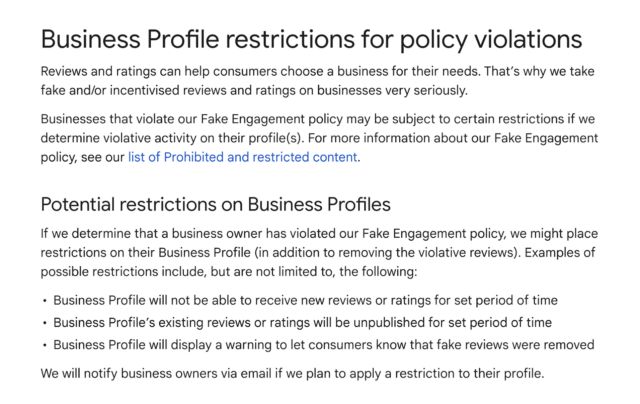
Aside from losing the fake reviews, Google might:
- Disable new reviews temporarily
- Hide existing reviews—even genuine ones
- Display a public “shame banner” on their listing to warn consumers of fake reviews
If you’re wondering what this “shame banner” looks like, local marketing advisor Mike Blumenthal shared an example of one in the wild from the UK.
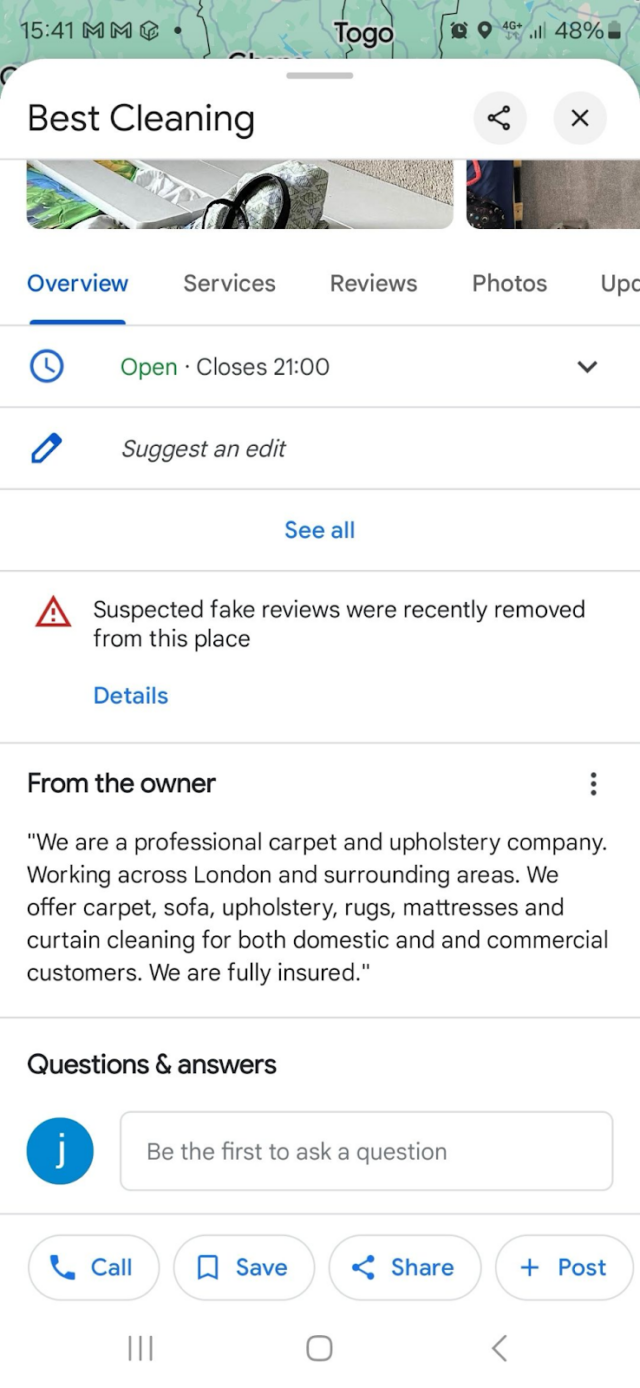
While this could be cool, if you’re like me, you may already be wondering about “false positives” and if adequate recourse will be in place.
Will you now be targeted with fake positive reviews from competitors and black hat SEOs trying to sabotage your business? To be frank, yeah, probably.
Though fairly uncommon, I have already seen “positive review attack” complaints on the GBP Help Community. Here’s what I mean:
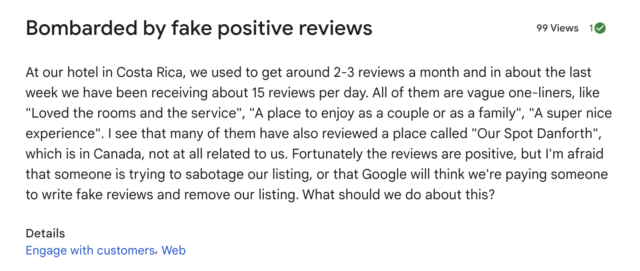
While these more serious punishments will hopefully discourage merchants from buying fake reviews, they will also entice some to attack their competition.
For that reason, it would probably be wise to start:
- Monitoring 5-star review activity for unrecognized reviews
- Reporting suspicious 5-star reviews immediately
- Contacting Google support if the reviews are not removed
Fortunately, it does appear merchants will be warned before punishments are placed, allowing time to submit an appeal of the decision.
That’s good… however, if history proves anything, Google doesn’t have the best track record of processing appeals and protecting merchants.
In my years of experience consulting business owners and communicating with Google Support about review violations, I’m not exactly confident the appeal form will be user-friendly.
In fact, reporting review violations is currently so difficult that merchants often turn to consultants or shady reputation management services to help remove reviews…
…reviews that violate Google’s own policies, mind you.
And where do they find these services? On Google, of course!
What’s worse? Google enables and profits from Google review removal services by means of Google Ads—and these ads are ripe with deceptive marketing, manipulative sales tactics, and false pretenses that prey on desperate business owners. Let’s take a deep dive into that.
Reputation Rackets Alive and Thriving
Online Reputation Management, or ORM, has had many shady actors for quite some time. Forbes wrote an exposé in 2013 highlighting manipulative and even illegal practices throughout the industry, from outright extortion to reputation service price gouging.
I’ve seen countless examples of individuals getting random negative reviews only to be immediately contacted with a cold offer to remove their negative reviews for a fee. Some of these scammers flatly admit it’s blackmail!
These tactics predate the current Google review gold mine, such as the notorious mugshot removal scams (article only available in USA) that acquire and post mugshots online, and then contact the individuals with an extortion fee to remove it. In this case, you aren’t paying for reputation management—you are just paying a ransom.
And just like kidnapping, paying the ransom encourages copycat antics.
While these blackmail tactics are obvious abuse, an even more successful racket has been operating in the open for years: “Guaranteed” review removal services.
Beware Ads For “Guaranteed” Review Removal
Have you ever been desperate to remove a bad review?
Countless “reputation management” companies know you have – or will be, and are ready to profit from that desperation.
GUARANTEED REVIEW REMOVAL
ONLY PAY IF IT’S REMOVED
Maybe you’ve seen these ads on Google, LinkedIn, Instagram, Facebook, and so on.
Just search “remove Google reviews” and you’ll see as many ads as if you were searching for a personal injury lawyer.
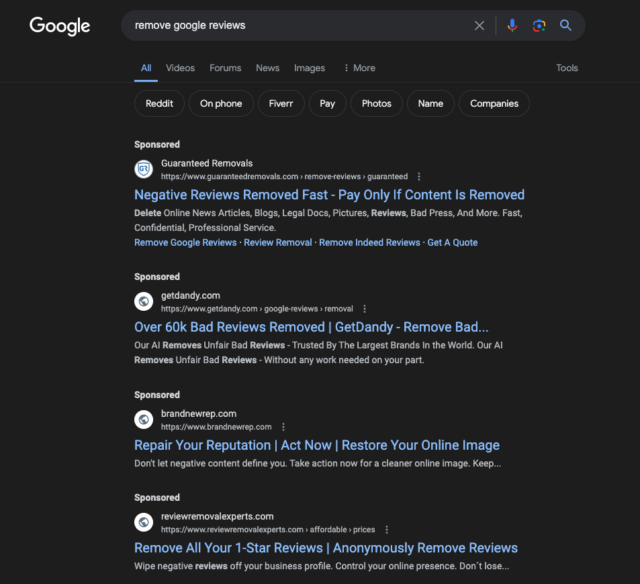
These ads have been shown for years above Google’s free review management tool—a tool that many don’t even know exists, let alone how to use it.
And these ads aren’t cheap. Some keywords related to Google review removals are fetching a staggering $40 per click or more in Google Ads. At those prices, Google review removal is quickly earning itself a spot among the most expensive paid search categories like loans, insurance, mortgages, and attorneys!
That’s because it’s a wildly profitable industry that relies on desperate merchants who will pay (possibly anything) to have a negative review removed.
For example, I once helped a small business owner, a dog trainer, who had a review from a bitter romantic partner who accused him of abusing animals. For those who love animals, that’s an instant dealbreaker and a possible death sentence for this business.
He risked a lot of money to companies that promised to remove the review, yet none were successful (despite obvious violations in the review).
I knew the review broke GBP guidelines and there was a path of recourse. I gave the business owner some advice which subsequently had the review taken down successfully (and no, I didn’t charge a “guaranteed removal fee”).
With keyword planner reporting over 250,000 searches per month related to removing Google reviews, I know many are falling for a gimmick – or else no business in their right mind would pay up to $40 to win a single click.
I’ve reported thousands of Google reviews that were successfully removed. As a GBP Product Expert, you can find me volunteering on the Google Help Community regularly helping merchants with bugs, suspensions, and yes, many review violations. I know firsthand that no reputation company, no matter how high their fees, can be better at reporting Google reviews than any average person who really understands the process and Google policies.
For one, reviews are only removed when they violate Google’s restricted content policies. No company can delete the review, nor can you pay Google to remove it.
There is no proprietary secret or backdoor to get reviews removed. The real challenge is actually getting a Google Support representative who is aware of and understands the guidelines (in your native language). That’s it.
So, at best, any paid service is just good at communicating with Google Support and informing them of their own guidelines.
And that’s at best. What’s actually happening is often worse.
Why You Shouldn’t Pay “Only if it’s Removed”
I get it, it’s enticing. Especially if you’re a civil trial lawyer, for example, who works on a similar basis.
Why should you pay unless the desired outcome is achieved? Seems like a no-brainer, but isn’t that simple.
How do these reputation companies do it, exactly? Is it a backdoor connection at Google? An algorithm? Do they have a team of super lawyers to threaten legal action against the official monopoly of search?
What’s the secret!?
*drumroll*
… nothing.
The real secret sauce is not their reporting tactics, it’s their business model.
Here it goes: They click the flag button, and then they bill you $1,000 if the review disappears.
And yes, I have seen agreements for much more than $1,000 per review. Do this at scale, and we’re talking some serious dough. No wonder they are paying $40 per click for the ads!
Now, some of these companies may be more sophisticated in their tactics than just clicking the report button. And by “sophisticated”, I mean using Google’s free review management tool that I mentioned above.
Even then, no one can guarantee or promise your review is coming down. Only Google, and Google alone, has the authority to remove a review.
The other issue is that there is absolutely no reliable way to attribute who or what event triggered a review to finally get removed. Google does not send a certificate that says “Congratulations Generic Reputation Company LLC—you removed this review! Go ahead and bill your customer now!”
That’s because Google removed the review, because it already violated their guidelines. It wasn’t because of Generic Reputation Company LLC, you, me, or anyone else.
It was because Google didn’t notice the violation, but now they do… oops!
How Reviews Are Actually Removed
No ORM company can claim or even prove that they were responsible for a Google review being removed.
Despite reporting thousands of reviews myself, I have never once been informed that I was responsible in any way, nor can I truly take credit for the results.
Let me explain: Reviews can come down at any time. It can be the result of:
- Flagging from the business owner or other users
- Appeals in the Review Tool
- Escalations on the GBP Help Community
- The user removed it themselves
- The reviewer’s account was suspended
- Possibly a combination of reports
- Or even just automatically from a Google algorithm update
Just like the search algorithm, Google periodically pushes updates to their review filter algo.
Earlier this year, Google said they removed 45% more reviews in 2023 thanks to their new review algorithm.
Google also does not inform anyone of the precise source of removal or if they were affected by this algorithm, likely to prevent review manipulation.
So what happens if your review gets taken down by one of these algorithms after you sign a guaranteed review removal contract?
How “Guaranteed” Removal Works
Those willing to pay anything to remove a review usually don’t care who removes the review. So what if an ORM company can’t prove they really did it? The review is gone, hallelujah!
Well, not so fast. Aside from the ethics concerns of their marketing strategy, the reason you should care is because you can do it for free, and may even be paying for nothing.
Without naming names, here’s a shot directly from the website of one of the biggest advertisers in this space:
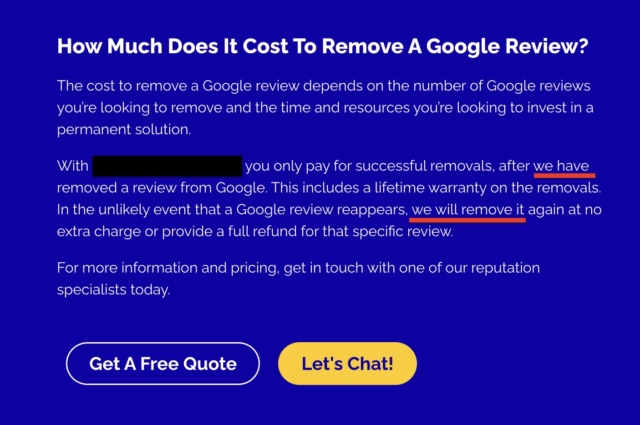
Ehem, “we”? you mean when Google removes it?
Over the past year, this company’s ad spend has skyrocketed, estimated at over 4,000 paid search users per month.
Not to mention, this is actually ‘helpful content’ too, by the way, because ironically they seem to be one of the lucky ones to benefit from the March core algorithm update!
In the August update, they saw even greater gains.
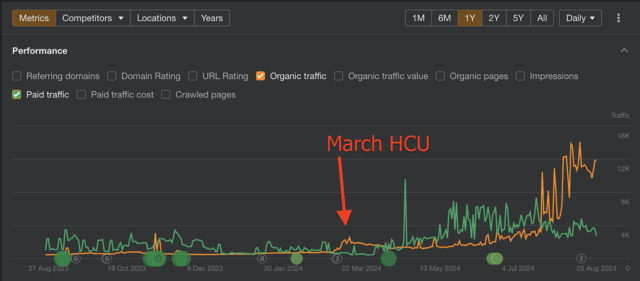
Meanwhile, other businesses suffered or were even forced to file for bankruptcy as the result of the controversial March “Helpful Content” Update, like in this example reported by Barry Schwartz.
It’s not just one offender either. Here’s another popular “content removal” service:
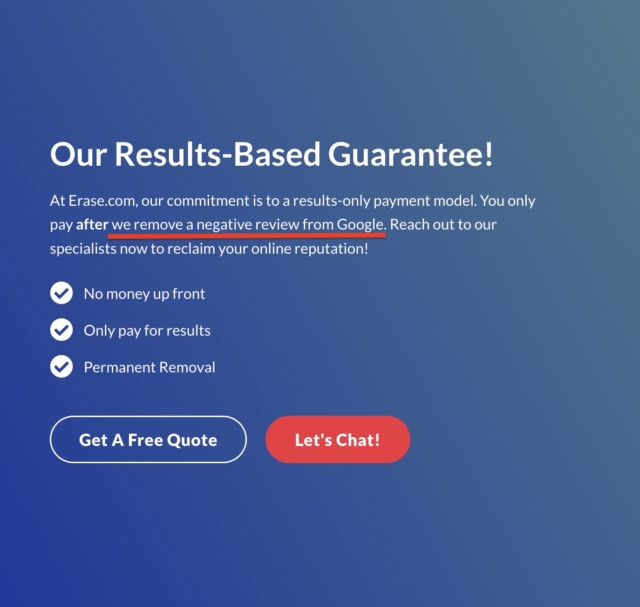
Or this one, another Google Ad buyer, with this on their Google Ads landing page:
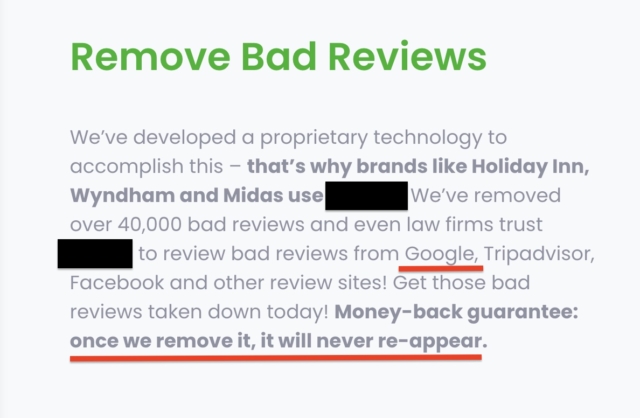
(Google reviews reappear after removal all the time, by the way.)
The consistent pattern I find with merchants is that many seem to genuinely believe these ORM companies must have a super-secret connection or black hat tactic.
So how could they get away with selling bupkis?
To illustrate why that can be so, consider civil trial lawyers again, many of whom also use this same payment model: except their work is evident. There’s no question which firm represented you, who showed up on trial day, or who negotiated the settlement. “No Win – No Fee” agreements seem perfectly fair in this case, since there’s no question who did the work and won.
But when it comes to ORM, they actually don’t have to do any work to get paid under this model. Sure, the more work they do, the more money—so it’s in their best interest to try. And maybe some do work.
But my point is that this “removal guarantee” marketing model is deceptive and unethical, even if they do work. That’s because “success” is not based upon their work. It’s based upon an event that can occur unrelated to their work, and is often accompanied by lies about how the process really works.
With this model, money can still be made without a deliverable or accountability. Sign enough contracts and some will pay off. It’s just a numbers game.
In the same vein, I could guarantee your favorite NFL team will win the Superbowl: only pay if they win! With at least one customer per team, I’m guaranteed a payday.
And hence the doubling, tripling, and quadrupling down on Google Ad allocation from review removal services. And because customers are only billed after their desired outcome, few will complain!
I have reviewed contracts from some of these companies. Generally, the agreement is if the review disappears within 3 months, 6 months, etc., for any reason: you pay up. With no option to back out, there isn’t actually a deliverable. It’s really just a guarantee from you to owe someone else money in the event your review suddenly disappears…
…wait, what?
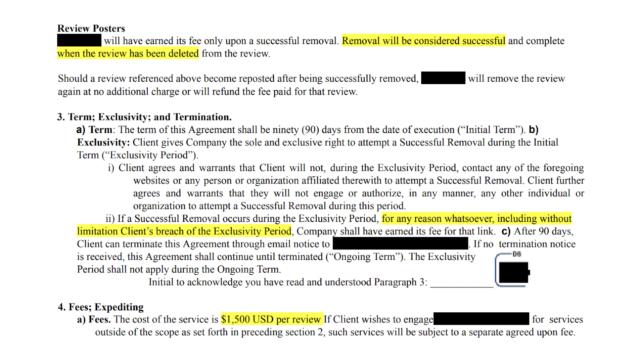
Note the exclusivity clause. The client is prohibited from reporting the review or merely contacting anyone in relation to review removal; but oh, by the way, you still get billed anyway even if you don’t breach this clause.
Huh? So why follow the exclusivity clause if there is no incentive?
An exclusivity clause usually protects one or both parties from being undermined. Ironically, in the case of Google reviews, this exclusivity agreement actually works against the vendor’s own definition of “successful removal.”
So the true purpose of this “clause” is just more deception. It appears to be an acknowledgment disguised in legalize that they can’t prove a deliverable, nor will they know themselves how a review got removed and if there was even a breach—so they ask you kindly not to report the review in the meantime (to avoid objections they cannot counter).
To me, this agreement sounds like a dentist who, looking at a clearly rotten tooth, asks that you promise to pay him when the tooth is removed. Sounds fair, right?
Except he didn’t say he would remove it. Check the fine print. He’s just going to send a bill when that bad boy falls out!
And if the tooth never comes out? Meh, whatever. No loss for him anyway. He’s got 100 other customers with poor flossing habits just waiting to pay off.
Yeah. That’s the shtick. If the company actually does nothing, and the review comes down anyway, expect a bill.
(The same contract shown above also requires a credit card on file for automatic billing and includes a credit bureau reporting agreement if you fail to pay.)
Unfortunately, unlike the dentist, you can’t prove the ORM company didn’t do any work. The agreed terms were indeed met, and you’re left holding the bag. They, on the other hand, get to safely hide behind apparent “proprietary industry secrets” and a clever contract.
So, really, this isn’t guaranteed review removal at all. It’s professional gambling with guaranteed stakes… and you’re the banker!
I’m no lawyer, but the legality of these contracts is questionable to me. At a minimum, they are super lame. I know I wouldn’t sign one.
Google should know better than anyone that guaranteed review removal offers are bogus. The least they could do is show their free review management tool more prominently—or maybe just ban false advertisements?
Summing Up: Take Contol of Your Reputation Management
Google is finally getting tougher on fake reviews, but who knows if it’s the action many were hoping for. I’ve explained the sad state of review removal, deceptive reputation services, and how Google profits as a result.
Because these shady review services are only possible due to Google’s weak enforcement of its own policies, merchants may want to follow the track record and take measures to prevent any possible implications. By taking the time to understand Google policies and the new guidelines for fake engagement, you can mitigate the risk of falling victim to any new black hat tactics on the horizon.
Be sure to warn other business owners, too. The more that are aware, the more likely there is to be meaningful action to prevent online review abuse that consistently hurts businesses and consumers alike.

